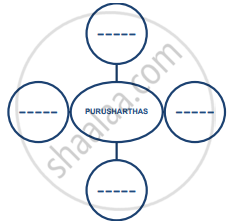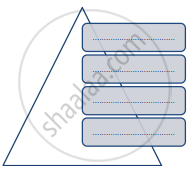Advertisements
Advertisements
Question
Differentiate between:
Traditional woman and Modern woman
Solution
| Points | Traditional woman | Modern woman | |
| (1) | Meaning | Initially, traditional women had access to education, but this declined over time. | Modern women have significantly improved access to education, supported by legal and social reforms. |
| (2) | Right to Marry | They enjoyed some early autonomy in marriage, which was reduced by practices such as child marriage. | Their marital rights are enhanced, including legal protection against child marriage and support for widow remarriage. |
| (3) | Social and Religious Rights | Traditional women were active in early Vedic social and religious spheres but were later restricted to household duties. | Modern women are active in public life, engage in various professions, and participate more inclusively in religious activities. |
| (4) | Legal Rights | Their legal rights were limited; they were dependent on male relatives and had no property rights. | They have enhanced legal rights, including property and inheritance rights, and are protected against discrimination. |
APPEARS IN
RELATED QUESTIONS
What was the nature of education during the Early Vedic period?
Monks in Buddhist monasteries were called ______.
Correct the underlined word and complete the statement.
Elementary education was imparted in Khanqahs during the medieval period.
Write short notes.
Education during the Early Vedic period.
Explain the following concept with examples.
Varna system
Buddhism spread to several parts of India and beyond.
Give your personal response.
Jainism and Buddhism provided hope to all people.
Digambara and Shvetambara are sects in ______.
Maktabs were centres of ______.
Correct the incorrect pair and rewrite it.
| I | Ahura Mazda – Judaism |
| II | Vardhamana Mahavir – Jainism |
| III | Guru Nanak Dev – Sikhism |
| IV | Jesus Christ – Christianity |
Correct the incorrect pair and rewrite it.
| I | Brahmin – Priest |
| II | Kshatriya – Trader |
| III | Vaishya – Farmer |
| IV | Shudra – Menial work |
Identify the appropriate term from the given option in the box and rewrite it against the given statement.
DRA VIDIAN LANGUAGE FAMILY
VARDHAMAN MAHAVIR
PANDIT NEHRU
INDO-ARYAN LANGUAGE FAMILY
DANIEL LERNER
PATRIARCHY
- Considered to be ‘Kevalin’ (omniscient)
- Sociologist who coined the term ‘ modernisation’
- Kashmiri, Assamese, Bengali
- Panchsheel philosophy
- Male dominance in society
Correct the underlined word and complete the statement.
Jnana Marg, Bhakti Marg, Raja Marg and Karma Marg are the four ways to achieve wealth.
Status of women in India during Early Vedic Period
Status of women in India during Later Vedic Period.
Islamic education during Medieval period
Explain the following concept with examples.
Ashramvyavastha
Explain the following concept with example.
Madrasa
Explain the following concept with example.
Langar
Complete the concept map.

Complete the concept map.

Complete the concept map.
Caste hierarchy

Complete the concept map.
Ashramvyavastha

Correct the incorrect pair and rewrite it.
| I | Ahura Mazda – Judaism |
| II | Vardhamana Mahavir – Jainism |
| III | Guru Nanak Dev – Sikhism |
| IV | Jesus Christ – Christianity |
| V | Brahmin – Priest |
Correct the underlined words, complete and rewrite the statement:
Judaism is polytheistic religion.
Correct the incorrect pain and rewrite it.
Identify the appropriate term from the given options and rewrite it against the given statement.
Founder of Sikhism.
The new religion Din-I-Ilahi was established by ______.
Correct the incorrect pair and rewrite it:
Identify the appropriate term from the given options and rewrite it against the given statement:
Doing one’s duties by following the path of righteousness, without the expectation of a reward.
Correct the underlined word, complete and rewrite the statement:
The ultimate aim of Hindus is Artha.
